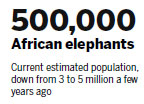
Conservation organizations have called on the Chinese government to impose a total ban on the ivory trade in the country within the next two years, and with no expiration date or financial compensation for those who would lose business.
Xu Yang, a wildlife trade specialist at the World Wildlife Fund in China, said the majority of Chinese consumers would stop buying ivory products if the legal trade channel was shut down.
"It would also leave no room for speculators to operate if the ban on the ivory trade in China were permanent," Xu said.
The WWF and TRAFFIC, an NGO that monitors the global wildlife trade, are compiling a feasibility report on banning the ivory trade in China, hoping that it will become a technical reference document for the Chinese government.
Zhou Fei, head of the China program at TRAFFIC, said the African elephant population had dropped from 3 to 5 million, to only 500,000 in recent years.

"If we don't do anything, African elephants will be functionally extinct within two decades," Zhou said.
At present, the trade and manufacture of registered ivory products is legal in China. In 2008, China got approval from the Convention on International Trade in Endangered Species of Wild Fauna and Flora, the body that regulates the international wildlife trade, to buy about 62 metric tons of ivory in a one-time sale from Botswana, Namibia, South Africa and Zimbabwe. Every year, about 5 tons of that ivory is released into the market.
However, a WWF China survey found that more than half of consumers don't know how to distinguish between legal and illegal ivory products.
"Despite the fact that every legal ivory carving has an identity card, many consumers don't know to ask for the card. These unclaimed cards can then be used for illegal ivory products," Xu said.
"Besides, China has a growing middle-class, people who would like to purchase ivory as a symbol of social status. The limited amount of ivory put into the legal market will not satisfy this demand."








